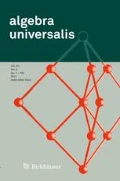Abstract
We consider all positive fragments of Tarski’s representable relation algebras and determine whether the equational and quasiequational theories of these fragments are finitely axiomatizable in first-order logic. We also look at extending the signature with reflexive, transitive closure and the residuals of composition.
Similar content being viewed by others
References
Andréka, H.: On the representation problem of distributive semilattice-ordered semigroups. Tech. rep., Mathematical Institute of the Hungarian Academy of Sciences (1988). Abstracted in Abstracts of the American Mathematical Society, 10(2):174, March 1989
Andréka H.: Representation of distributive lattice-ordered semigroups with binary relations. Algebra Universalis 28, 12–25 (1991)
Andréka H., Bredikhin D.: The equational theory of union-free algebras of relations. Algebra Universalis 33, 516–532 (1995)
Andréka H., Mikulás Sz.: Lambek calculus and its relational semantics: completeness and incompleteness. Journal of Logic, Language and Information 3, 1–37 (1994)
Andréka H., Németi I.: Axiomatization of identity-free equations valid in relation algebras. Algebra Universalis 35, 256–264 (1996)
Andréka H., Németi I., Sain I.: Algebraic logic. In: Gabbay, D., Guenthner, F (eds) Handbook of Philosophical Logic, vol. 2, second edn., pp. 133–247. Kluwer Academic Publishers, Dordrecht (2001)
Bredikhin, D.: The equational theory of relation algebras with positive operations. Izv. Vyash. Uchebn. Zaved. Math. pp. 23–30 (1993) (Russian)
Bredikhin D., Schein B.: Representation of ordered semigroups and lattices by binary relations. Colloquium Mathematicum 39, 1–12 (1978)
Conway J.: Regular Algebra and Finite Machines. Chapman and Hall, London (1971)
Crvenković S., Dolinka I., Ésik Z.: The variety of Kleene algebras with conversion is not finitely based. Theoretical Computer Science 230, 235–245 (2000)
Ésik Z., Bernátsky L.: Equational properties of Kleene algebras of relations with conversion. Theoretical Computer Science 137, 237–251 (1995)
Haiman M.: Arguesian lattices which are not type 1. Algebra Universalis 28, 128–137 (1991)
Hirsch R.: The class of representable ordered monoids has a recursively enumerable, universal axiomatisation but it is not finitely axiomatisable. Logic Journal of the IGPL 13, 159–171 (2005)
Hirsch R., Hodkinson I.: Relation Algebras by Games. Elsevier, Amsterdam (2002)
Hirsch R., Mikulás Sz.: Representable semilattice-ordered monoids. Algebra Universalis 57, 333–370 (2007)
Hirsch R., Mikulás Sz.: Positive reducts of relevance logic and algebras of binary relations. Review of Symbolic Logic 4, 81–105 (2011)
Hodkinson I., Mikulás Sz.: Axiomatizability of reducts of algebras of relations. Algebra Universalis 43, 127–156 (2000)
Jipsen P., Jónsson B., Rafter J.: Adjoining units to residuated Boolean algebras. Algebra Universalis 34, 118–127 (1995)
Kozen D.: A completeness theorem for Kleene algebras and the algebra of regular events. Information and Computation 110, 366–390 (1994)
Maddux R.: Relation Algebras. Elsevier, Amsterdam (2006)
Mikulás Sz.: Axiomatizability of algebras of binary relations. In: Löwe, B., Piwinger, B., Räsch, T (eds) Classical and New Paradigms of Computation and their Complexity Hierarchies., pp. 187–205. Kluwer Academic Publishers, Dordrecht (2004)
Monk J.: On representable relation algebras. Michigan Mathematics Journal 11, 207–210 (1964)
Németi I.: Every free algebra in the variety generated by the representable dynamic algebras is separable and representable. Theoretical Computer Science 17, 343–347 (1982)
Németi I.: Algebraizations of quantifier logics, an introductory overview. Studia Logica 50(3–4), 485–569 (1991)
Pratt V.: Action logic and pure induction. In: Eijck, J. (eds) Logics in AI: European Workshop JELIA ’90., pp. 97–120. Springer, Heidelberg (1990)
Redko V.: On defining relations for the algebra of regular events. Ukrain. Mat. Z. 16, 120–126 (1964) (Russian)
Schein B.: Representation of subreducts of Tarski relation algebras. In: Andréka, H., Monk, J., Németi, I. (eds) Algebraic Logic., pp. 621–635. North-Holland, Amsterdam (1991)
Author information
Authors and Affiliations
Corresponding author
Additional information
Presented by J. Raftery.
Andréka’s research was supported by OTKA grant Nos. 73601 and 81188.
Rights and permissions
About this article
Cite this article
Andréka, H., Mikulás, S. Axiomatizability of positive algebras of binary relations. Algebra Univers. 66, 7 (2011). https://doi.org/10.1007/s00012-011-0142-3
Received:
Accepted:
Published:
DOI: https://doi.org/10.1007/s00012-011-0142-3



